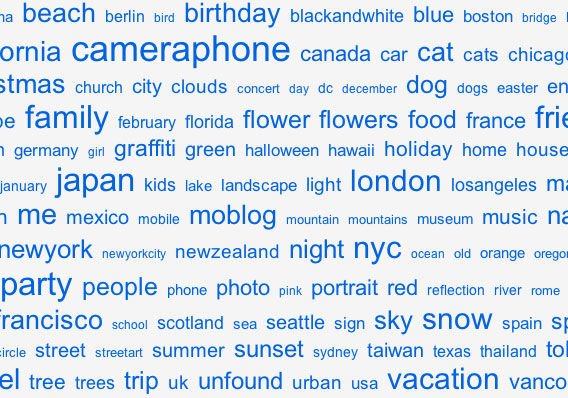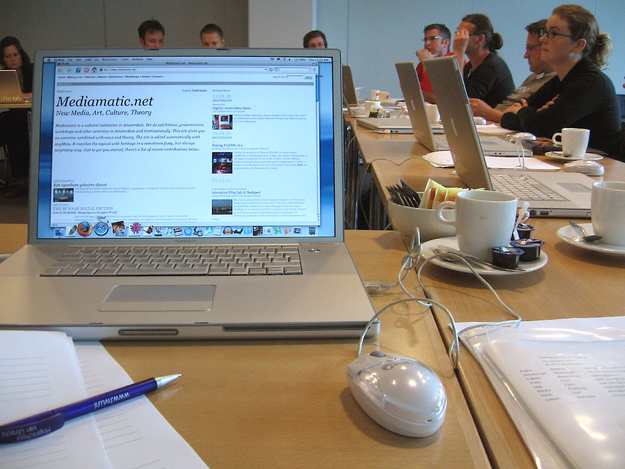Verschillende snel populair wordende applicaties gebruiken mobtagging; de bekendste zijn Flickr voor foto's en Delicious, voor url's. Maar ook Technorati, een searchengine die meer dan 6 millioen weblogs indexeert, biedt sinds enkele maanden een tagging service aan voor bloggers. In Mediamatics’ Videoletters.net, de sociale omgeving voor bewoners van het voormalige Joegoslavië wordt mobtagging gebruikt om de bijdragen van de gebruikers te waarderen en te ordenen.
Ge'mob-tagde' informatie wordt gestructureerd door de gebruikers volgens hun eigen inzichten en interesses. Er is geen centrale ordening, geen hierarchie van begrippen en onderverdelingen; het informatienetwerk organiseert zich 'bottom up'.
Mob-tagging wordt een 'revolutie in het webgebruik' genoemd, en de belofte is groot: het maakt informatiestructuren uitermate flexibel en snel aanpasbaar. Informatie ordent zich langs verwantschappen die door gebruikers worden aangegeven. Gebruikers kunnen delen in elkaars intelligentie.
Maar ook nadelen springen in het oog: verschillende behoeften en achtergronden van gebruikers leiden makkelijk tot een soep van metadata die de ontsluiting van informatie niet bevordert.
Doel van de workshop
Het doel van de workshop is om antwoord te krijgen op de vragen:
– Voor wat voor informatie heeft mobtagging interessante eigenschappen ten opzichte van meer centraal georganiseerde informatiestructuren?
– Voor welke gebruikers zijn die eigenschappen relevant?
– Zijn er voor specifieke doeleinden aanpassingen te bedenken die de voordelen van mobtagging versterken en de nadelen verminderen?
Traject
In deze workshop worden een aantal recente cases gepresenteerd en besproken door vooraanstaande makers en denkers, die ook de discussies modereren.
Aan de hand van gezamenlijk geformuleerde vragen experimenteren de deelnemers hands-on met 'gemobtagde' informatie. Er is ook plaats voor vragen over eigen cases.
Conclusies en ideëen worden gedocumenteerd en gepubliceerd op de Mediamatic Website.
Voor wie?
De workshop is bedoeld voor 10 tot 16 bloggers, webmasters, -ontwerpers, kunstenaars en theoretici die ervaren webgebruikers zijn en die meer willen weten van mogelijke toepassingen van mobtagging.
Workshop Report
Mobtagging (or folksonomy): the practice of internet users to tag online information and, more importantly, to exchange these tags with other users.
What can it do? What can it not do? How does it change our way of dealing with online information?
The effect of mobtagging is that online content gets described from the users' point of view. Mobtagging treats the web as one enormous open database that everybody can structure according to their own desire.
Together with ANMI Summerschool, Mediamatic organized the Mobtagging workshop in which the nature of tagged information structures was addressed from a user’s point of view. In order to ask the right questions, the whole practise of tagging had to be explained first.
What is metadata? When is a tag useful for others? What is the effect of mobtagging on online information?
Information architect Marcel van Mackelenbergh gave a clear insight in the design and functionality of usable tags, treating handy concepts like facet-analysis and basic-levelness.
He made the power of mobtagging in the on- and offline world clear in a very enthousiastic way.
Ino Paap is internet designer and programmer at Mediamatic. He presented Mediamatic projects in wich tagging and mobtagging play important roles. He focussed on how mobtagging can be used in the context of social processes in online communities. He showed Videoletters.net, a website where people can find lost friends in former Yugoslavia. While looking at this online community (and many others) it became clear that tags are indeed language and therefore also gender specific. In another project called Geheugen van Oost, tagging is also an important tool to navigate through the site. In this community 60 reporters collect stories and add keywords to them. The last example hva.onderwijsontwikkeling.nl showed how three departments of different institutions exchange knowledge by letting users create their own tags and linking them to specific content. In this way an original network is created that provides different views on the knowledge available.
With technical and theoretical knowledge about social tagging and a lot of examples at hand, it was time for the participants to develop their own user scenario’s and jump deeper into the practical sides of mobtagging. The questions they ask temselves were:
What is the target audience? What does your audience want to know about the online information?
What is their goal? What steps do they have to take to reach that goal? What digital pathway would a user follow? And most importantly: what is the effective metadata that can be linked to the information?
After designing user scenario’s, individual ideas and scenario proposals were put to the test. Models were built by using del.icio.us and 'quickpost'. By sharing the scenario’s in del.icio.us the social dimension of linking metadata to online information became explicit.
In discussing the tests and excercises, a couple of interesting conclusions could be drawn on the uses of mobtagging.
- Mobtagging can be used to filter the overload of information faster and more adequately than Google can.
- From more adequately and personally, or pinpoint interesting information faster than the average search engine or online directory.
- Mob- or social tagging can provide more precise search results for specialized interests.
- Another interesting effect of mobtagging: the more people use it, the more useful it gets.
- When there is a shared passion among the users, mobtagging makes sense and allows users to relate to eachother. But tags are not nescesarily communicating to everybody.
- Mobtagging can support very different kinds of user scenario’s, not only to find information.
- Tagging has the same problems as any language has. The same ambiguities, the same contexts and dependencies.
- Tagging supports expressing various sides of your personality.

